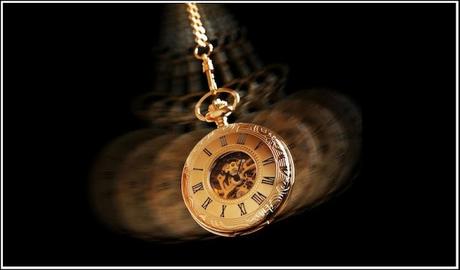Is that okay? Do you need to know more? If so, it turns out there's a wealth of information on the internet about different types and uses of pendulum, from mechanisms in time-pieces to those used in dowsing, and special crystal ones for promoting "inner growth". You think I'm kidding? Check out 'A Spiritual Guide on how to use a Pendulum' or 'How to use a Pendulum for Energy Guidance'. (And no, I'm not providing links. Do your own dirty work, dear readers, if you're so inclined.)
My father made a pendulum wall clock as a present for my wife and me. When we got divorced he insisted that she should keep it. He didn't like divorces. I don't like pendulum clocks. Pocket watches on the other hand...

"You are getting sleepy..."
... have been hypnotising people since 1841, when Dr James Braid, a Scottish surgeon and the man who coined the words neurohypnology, hypnotise and hypnotism, first pulled one out of his fob and used it to hypnotise. (Fob is my word of the week, the technical term for the small pocket in a man's waistcoat or waistband made to contain e.g. a keyring, a snuffbox or a watch.)Known in some circles as "the father of modern hypnotism", Braid became interested in the phenomenon after attending a series of performances of mesmerism by Charles Lafontaine. He was sceptical at first but was soon convinced that he was seeing altered states in the subjects and soon commenced conducting his own experiments in hypnotism, at first on himself and then on patients.
Of course it doesn't have to be a pocket watch, or even a pendulum, although the swinging watch on a chain has become the de facto cliché in books and films about hypnosis. It just has to be an object at the right distance from the subject so (s)he can concentrate the gaze. The suggestivity of the subject (a willingness to be hypnotised) is also a significant factor.
Braid went on to use hypnotism regularly and successfully in his medical practice and wrote a seminal treatise on the subject, from which I quote the following: "I consider the hypnotic mode of treating certain disorders is a most important ascertained fact, and a real solid addition to practical therapeutics, for there is a variety of cases in which it is really most successful, and to which it is most particularly adapted, and those are the very cases in which ordinary medical means are least successful, or altogether unavailing."
I've never been hypnotised, nor tried hypnotising myself or others. The fact that Braid practised upon himself first (in a long medical tradition of the experimenter boldly using him/herself as prime subject) led me to speculate about what might happen if self-hypnotism were to go wrong. Here's the poem that resulted...
On The Perils Of Self-HypnotismLate in the play (a tragi-comedy)the stage is set for its finale:velvet drapes half drawnallow a whey moon to filter through mullioned windowspicking out a thin manin hand-me-down clothes sitting erect on a battered chair before an empty grate. His breathsteams in cold air. From offstagea voice intones: "He hasn't eatena square meal in days, yetwith glazed eyes fixed to a point,he breaks out in a smile, his heartpumps for joy, pride fills his veins.His country's taken back the reinsand life has never been so goodas this." The audience cannotsee his smile, only his back and unkempt shock of hair. The man slowly rises, lets fall a pocket watch to the floor, lifts the lid of a dustbinstanding previously unnoticed in the corner, climbs in and carefully lowers the lid.The audience waits minutesfor something else to happenand when nothing does, they risein twos and threes and walkin awkward silence outthrough velvet drapes into the cold nightwith a whey moon.

Thanks for reading, S ;-) Email ThisBlogThis!Share to TwitterShare to Facebook
